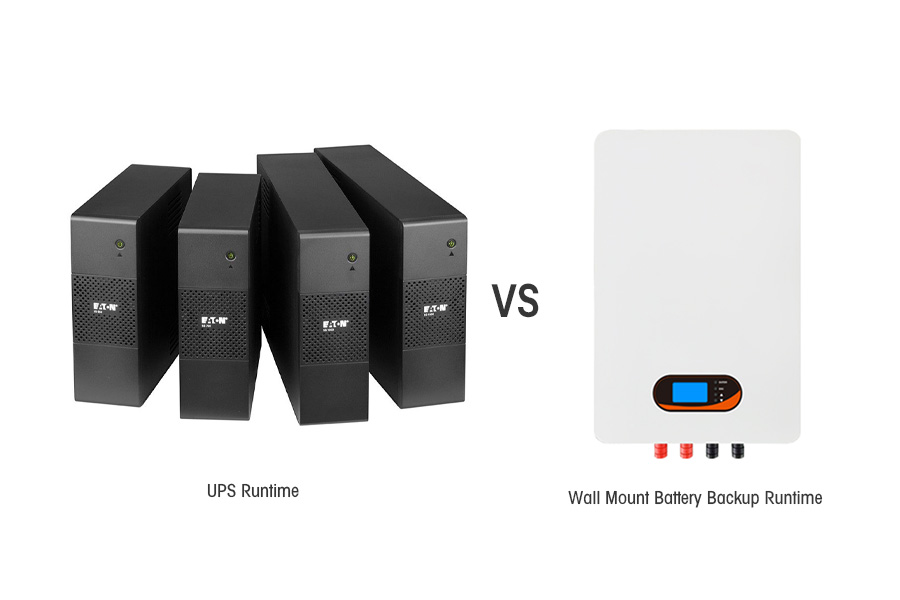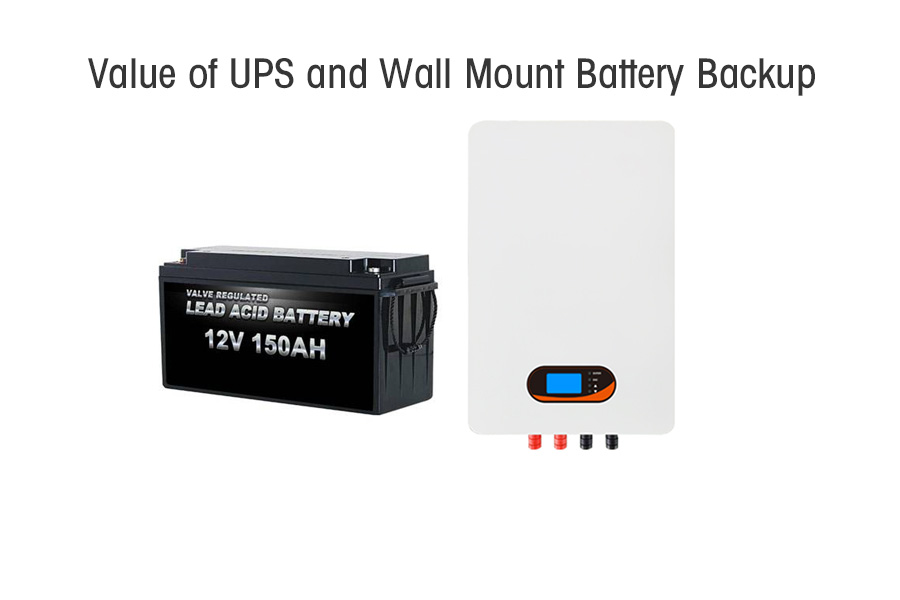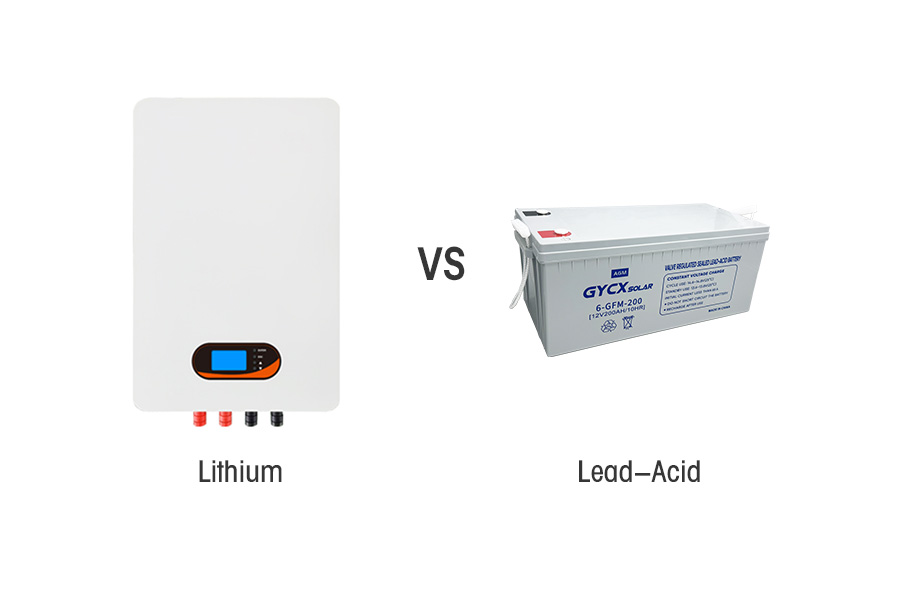Wat is het verschil tussen UPS en batterijback -up?
Navigeren door de wereld van machtsbescherming? U bent waarschijnlijk termen tegengekomen als "UPS" en "batterijback -up" en vraagt zich misschien af of ze uitwisselbaar zijn of dat er belangrijke verschillen zijn. Het begrijpen van deze onderscheidingen is cruciaal voor het maken van slimme keuzes om uw huis of bedrijf te beschermen tegen stroomonderbrekingen.
Terwijl een ups (Ononderbroken stroomvoorziening) is Een type batterijback -up, Het biedt meestal kracht op korte termijn en conditionering voor elektronica, voornamelijk om een veilige sluiting mogelijk te maken tijdens een storing. "Batterijback -up" Als een breder concept, Vooral moderne back -up van de batterij van de muurbevestiging" systemen (Vaak deel uit van een opslagoplossing voor thuis energie -opslag), Biedt veel langere runtimes en meer capaciteit, Ontworpen om essentiële circuits of zelfs hele huizen voor langere tijd van stroom te voorzien, vaak door zonne -energie op te slaan.

Bij Gycx Solar, We helpen onze klanten energie -veerkracht te bereiken. Hoewel een eenvoudige ups geweldig is voor uw computer, Als u erover denkt uw huis of bedrijf door langere storingen te houden, of het maximaliseren van uw zonne -investering, Een meer uitgebreide back -up van de batterij van de muurbevestiging" Systeem is vaak de oplossing. Laten we deze verschillen onderzoeken.
Welke UPS kan duren 24 uur?
Dromen van een power -oplossing die alles een hele dag tijdens een storing een hele dag soepel verliest? Als mensen aan een standaard UPS denken, Ze hopen misschien op zo'n uitgebreide dekking, maar is 24 uur back-up van een typische UPS een realistische verwachting?
De meeste standaard UPS -eenheden, zoals die ontworpen voor personal computers of kleine kantoorservers, zijn gebouwd om voor te gaan minuten tot misschien een uur maximaal - niet 24 uur. Hun primaire doel is om voldoende tijd te bieden om uw werk te besparen en apparatuur veilig af te sluiten tijdens een stroomversnelling, of om zeer korte power glitches te overbruggen. Voor echte 24-uurs back-up, je zou een heel groot nodig hebben, commerciële ups met uitgebreide (en duur) Externe batterijmodules, of meer praktisch, Een speciaal Wall Mount Battery Backup -systeem of een volledige Bess (Batterij-energieopslagsysteem).
Deze grotere systemen, vooral in combinatie met zonnepanelen om op te laden, zijn ontworpen voor precies dit soort uitgebreide runtime.

Duik dieper: Het bereiken van back-up met lange duur
Laten we duidelijk maken waarom typische UPS-eenheden tekortschieten voor 24-uurs behoeften en welke oplossingen werken:
- Typische UPS runtime: Een bureaublad -ups (Bijv., 500VA tot 1500VA) zou je kunnen geven 5-15 Minuten runtime voor een aangesloten pc en monitor. Een grotere server-kamer ups (Bijv., 3KVA tot 10KVA) mogelijk aanbieden 15-60 Minuten voor de beoogde belasting, Misschien een beetje meer met een of twee externe batterijmodules (EBM). Hun ontwerpfocus ligt op schone stroom en veilige afsluiting, niet verlengde off-grid werking.
- Waarom niet 24 Uren voor standaard UPS? Om typische huishoudelijke ladingen voor te stellen 24 Uren zou een enorme batterijcapaciteit vereisen, Veel groter dan wat is ingebouwd in standaard UPS -eenheden of wat praktisch is om via EBM's toe te voegen voor de meeste gebruikers. De kosten en fysieke grootte zouden onbetaalbaar zijn.
- De oplossing: Wandbevestig batterij Back -up / Home Bess: Dit is waar systemen zoals de Tesla Powerwall, Enphase -toeslag, LG Chem Resu, of de modulaire LFP (Lithium-ijzerfosfaat) Systemen die GYCX -zonne -zon vaak ontwerpen spelen een rol. Deze worden specifiek gemanipuleerd voor hoge capaciteit (Bijv., 10kWh, 13.5kWh, 20kWh, en schaalbaar omhoog) en kan essentiële thuiscircuits voeden (lichten, koelkast, internet, medische hulpmiddelen) of zelfs hele uren hele huizen.
- Met opladen van zonne -energie: Wanneer een back -up van de batterij van een wandmontage is gekoppeld aan een zonnepaneelsysteem, het kan overdag opladen. Indien correct op maat voor uw ladingen en zonneproductie, Dit kan effectief stroom leveren door meerdere dagen van uitval, het bereiken of overtreffen van dat doel van 24 uur, Vooral tijdens zonnige periodes. Dit is het pad naar echte energieveerkracht.
- Generatoren: Traditioneel, generatoren (gas, diesel, propaan) zijn een oplossing geweest voor lange storingen, Maar ze komen met lawaai, brandstofopslag, emissie, en onderhoudsproblemen. Batterijsystemen bieden stil, schoon, en steeds meer kosteneffectieve alternatieven, Vooral met zonne -energie.
Dus, Terwijl een standaard UPS je niet door een volledige dag doorbrengt, Een modern back -upsysteem voor wandbevestiging, Idealiter opgeladen door zonne -energie, kan zeker!
Hoe lang gaat een back -up van de UPS -batterij duren?
Je hebt een ups, Maar hoe lang kun je er eigenlijk op rekenen als de lichten uitgaan? Of misschien kijkt u naar een grotere back -up van de batterij van de wandbevestiging en vraagt u zich af over het uithoudingsvermogen. De duur hangt echt af van de capaciteit van het systeem en de hoeveelheid stroom die uw aangesloten apparaten tekenen.
Een typisch UPS -batterijback -up voor een computer of kleine server gaat van enkele minuten tot ongeveer een uur duren. Deze duur wordt voornamelijk beïnvloed door zijn VA (Was aan het monteren) of watt rating, de grootte van zijn interne batterijen, en cruciaal, het stroomverbruik (laden) van de apparatuur die erop is aangesloten.
In tegenstelling tot, groter "Back -up van de batterij van de muurbevestiging" Systemen of thuisbess -eenheden zijn ontworpen om veel langer mee te gaan - van enkele uren tot mogelijk meerdere dagen, vooral als ze worden opgeladen door een zonnepaneelsysteem tijdens daglichturen.

Duik dieper: Factoren die de back -upduur beïnvloeden
Laten we eens kijken wat de looptijd voor beide typen bepaalt:
Voor een standaard UPS:
- Laden (Watt): Dit is de grootste factor. Hoe meer kracht uw aangesloten apparaten tekenen, hoe korter de ups zullen duren. Een UPS-voeding alleen een modem en router zal veel langer duren dan dezelfde UPS die een high-end gaming-pc en grote monitor aandrijft. Fabrikanten bieden runtime -grafieken met de verwachte back -uptijd op verschillende belastingniveaus. Bijvoorbeeld, Een 1500VA/900W -ups kan u geven 5-7 Minuten bij volledige lading (900W) Maar 60-75 Minuten bij een lichte lading (100W).
- Batterij capaciteit (VAH of interne AH -rating): UPS -eenheden hebben interne batterijen (Meestal afgesloten loodzuur). Groter, UPS-eenheden met een hogere VA-rating hebben over het algemeen grotere batterijen of meer, het aanbieden van langere runtimes voor een vergelijkbare belasting. Sommige zorgen voor externe batterijmodules (EBM) Om dit uit te breiden.
- Batterijgezondheid: Loodzuurbatterijen degraderen na verloop van tijd af (meestal elke vervanging nodig 3-5 jaren). Een oudere batterij zal niet zoveel laden vasthouden als een nieuwe, Runtime verminderen.
Voor een back -up van een wandbevestiging batterij / Home Bess:
- Totaal bruikbare kWh -capaciteit: Deze systemen worden beoordeeld in kilowattuur (kWh), die de totale energie vertegenwoordigen die ze kunnen opslaan. Een batterij van 10 kwh slaat aanzienlijk meer energie op dan een typische ups. De bruikbaar Capaciteit is ook belangrijk, Omdat u deze batterijen meestal niet liet, 0% (Diepte van ontlading, of DOD, is vaak 80-100% Voor LFP).
- Huishoudelijk/zakelijk laadprofiel: Welke apparaten en circuits zijn verbonden met de batterijback -up? Runnen alleen essentiële lichten, een koelkast, en internet kan een 10kWh -batterij laten lang mee 12-24 uren of meer. Het toevoegen van een airconditioner of elektrische fornuis zal dat drastisch verminderen.
- Zonne -opladen: Dit is de game-wisselaar. Als de Bess deel uitmaakt van een zonne -energiesysteem (zoals die Gycx Solar is gespecialiseerd in), De batterijen kunnen overdag uit de zonnepanelen opladen. Dit betekent dat zelfs als de batterij 's nachts uitput, het kan de volgende dag worden aangevuld, mogelijk continu vermogen bieden door verlengde storingen zolang er voldoende zonlicht is.
- Systeemefficiëntie: De retourefficiëntie van de batterij en de efficiëntie van de omvormer zal ook een kleine rol spelen.
Bij GYCX Solar, Wanneer we een back -upsysteem van de batterij van de wandmontage ontwerpen, Een belangrijk onderdeel van ons proces is het begrijpen van uw kritische belastingen en de gewenste back -upduur (autonomie) Dus we kunnen de batterijcapaciteit nauwkeurig vergroten en, Indien van toepassing, Uw zonnepaneel om aan die behoeften te voldoen betrouwbaar.
Zijn UPS -batterijback -ups de moeite waard?
Als u kijkt naar de kosten van vermogensbescherming, Of het nu een relatief goedkope desktop -ups is of een belangrijkere investering in een back -upsysteem van een wandbevestiging, Het is natuurlijk om te vragen: Is het echt de kosten waard? In de meeste gevallen, Het antwoord is een duidelijk ja, Als de bescherming en voordelen die ze bieden, wegen ze vaak veel zwaarder dan hun initiële kosten.
Ja, Zowel standaard UPS -eenheden als grotere back -ups van de batterij van de muurbevestiging" (energieopslagsystemen voor thuis) zijn over het algemeen de investering waard. UPS -eenheden Bescherm gevoelige elektronica zoals computers en servers tegen gegevensverlies, corruptie, en hardware -schade veroorzaakt door plotselinge stroomuitval, zakken, of pieken - die u mogelijk veel meer besparen in vervangingskosten en verloren productiviteit dan de UPS zelf kost.
Grotere back -upsystemen voor batterij van de wandbevestiging Bied verlengde stroom aan tijdens storingen, Comfort bieden, veiligheid, en operationele continuïteit. In combinatie met zonne -energie, Ze ontsluiten ook aanzienlijke energiebesparing, maximaliseer zelf-consumptie van schone energie, en bieden meer onafhankelijkheid van energie, waardoor ze een zeer waardevol langetermijnactief zijn.

Duik dieper: De tastbare en immateriële rendementen
Laten we de waardepropositie bekijken:
Waarde van een standaard UPS:
- Gegevensbescherming & Hardware -veiligheid: Voorkomt het verlies van niet -geredde werkzaamheden en beschermt delicate elektronica tegen spanningspieken of brownouts die permanente schade kunnen veroorzaken.
- Sierlijke shutdown: Hiermee kan de tijd de computers correct afsluiten, servers, en andere kritieke apparatuur, het voorkomen van corruptie van bestandssystemen of hardwareproblemen.
- Productiviteit & Continuïteit: Voor bedrijven, Zelfs een korte power -glitch kan de bewerkingen verstoren. A UPS houdt essentiële systemen online.
- Kosteneffectieve verzekering: De kosten van een goede ups zijn minimaal in vergelijking met het vervangen van een beschadigde computer, server, of verloren gegevens herstellen.
- Gemoedsrust: Het kennen van uw kritieke apparaten is beschermd, biedt aanzienlijke gemoedsrust.
Waarde van een back -up van een wandbevestiging batterij / Home Bess (vaak gecombineerd met zonne -energie):
- Uitgebreide uitvalbeveiliging: Dit is een groot voordeel - lichten aanhouden, koelkasten rennen, medische hulpmiddelen aangedreven, Internet verbonden, en zelfs wat HVAC tijdens langdurige black -outs. Dit betekent veiligheid, comfort, en het vermijden van dure bederf of verstoringen.
- Maximaliseren van zonne -investeringen: Als je zonnepanelen hebt, Met een batterijsysteem kunt u de overtollige energie opslaan die overdag wordt gegenereerd voor gebruik 's nachts of op bewolkte dagen. Dit verhoogt uw zelfconsumptie van uw zon en vermindert uw afhankelijkheid van dure roosterkracht. Dit is een kernvoordeel dat we benadrukken bij GYCX Solar.
- Elektriciteitsrekening besparingen:
- Gebruikstijd (Toren) Optimalisatie: Laad de batterij op wanneer de elektriciteit van raster goedkoop is (vals) en gebruik die opgeslagen energie wanneer roostersnelheden hoog zijn (piek), het direct vermindert van uw rekeningen.
- Vraag lading vermindering (voor bedrijven): Het verlagen van de vraag naar elektriciteit van de elektriciteit kan de commerciële elektriciteitsrekeningen aanzienlijk verlagen.
- Energie-onafhankelijkheid & Weerstand: Verminder uw afhankelijkheid van een veroudering en soms onbetrouwbaar hulpprogramma. Krijg meer controle over uw energievoorziening.
- Voordelen voor het milieu: Door meer van uw eigen schone zonne -energie op te slaan en te gebruiken, U vermindert uw CO2 -voetafdruk.
- Potentieel voor verhoogde onroerendgoedwaarde: Huizen met zonne- en batterijopslag zijn steeds aantrekkelijker voor kopers.
GYCX Solar Story: We hadden een klant, De Smiths, die een zonnestelsel installeerde met een back -up van de batterij van de wandbevestiging. Een paar maanden later, Een grote storm veroorzaakte een stroomstoring in hun buurt in hun buurt. Terwijl hun buren in het donker waren, De Smiths hadden hun licht, koelkast, en essentiële medische apparatuur die naadloos draait, allemaal aangedreven door de zon en hun batterij. Voor hen, De gemoedsrust en veiligheid waren van onschatbare waarde, ver boven de kosten van het systeem overschrijden."
Doe UPS -batterijen af wanneer niet in gebruik is?
U hebt geïnvesteerd in een UPS- of een groter batterijback -upsysteem om klaar te zijn voor een storing. Maar wat als het een tijdje inactief zit? Verliezen die batterijen hun lading, zelfs als ze uw apparaten niet actief voeden, waardoor u mogelijk onbeschermd blijft wanneer u ze het meest nodig hebt?
Ja, Alle batterijen, inclusief die binnen -ups -eenheden en grotere back -upsystemen voor batterijen van de wandbevestiging, zal een fenomeen ervaren dat wordt genoemd "Zelfontlading," wat betekent dat ze in de loop van de tijd geleidelijk een deel van hun opgeslagen lading verliezen, Zelfs als ze niet zijn verbonden met een lading of actief worden gebruikt.
Echter, Moderne lithium-ionbatterijen, zoals de LFP (Lithium-ijzerfosfaat1. ) Chemie die vaak wordt gebruikt in de geavanceerde batterijsystemen voor geavanceerde wandbevestiging, hebben Zeer lage zelfontladingspercentages (typisch 1-3% per maand) Vergeleken met traditionele verzegelde loodzuur (SLA) Batterijen die vaak worden gevonden in oudere of goedkopere UPS -eenheden (die zichzelf kunnen ontkennen 3-20% per maand afhankelijk van het type en de temperatuur). Aanvullend, De elektronica binnen de UPS of Bess zelf verbruikt een kleine hoeveelheid standby -kracht om actief te blijven.

Duik dieper: Inzicht in zelfontlading en batterijbereidheid
Dit is wat u moet weten over de afvoer van de batterij wanneer niet actief wordt gebruikt:
- Wat is zelfontlading? Het is een intern chemisch proces binnen elke batterij waardoor het geleidelijk opgeslagen energie in de loop van de tijd verliest, Zelfs zonder externe belasting verbonden. De snelheid hangt af van de batterijchemie, leeftijd, en omgevingstemperatuur.
- Impact van batterijchemie:
- Lithium-ion (LFP, NMC): Zoals vermeld, Deze hebben aanzienlijk lagere zelfontladingspercentages. Dit betekent dat ze hun lading veel langere periodes kunnen vasthouden wanneer ze inactief zijn, waardoor ze uitstekend zijn voor back -uptoepassingen.
- Verzegelde loodzuur (SLA/VRLA - vaak in UPS): Deze hebben een hoger zelfontladingspercentage. Als een leadzuur UPS volledig niet is losgelaten (Niet aangesloten op de muur) gedurende vele maanden, De batterij kan aanzienlijk uitputten.
- Temperatuur is belangrijk: Hogere opslagtemperaturen versnellen zelfontlading voor alle batterijtypen. Het opslaan van batterijen in een koele omgeving helpt het opladen langer te behouden.
- Parasitaire afvoer van elektronica: De UPS- of BESS -eenheid zelf heeft controlecircuits, Monitoringsystemen, en vaak een display dat continu een zeer kleine hoeveelheid stroom verbruikt, Zelfs wanneer in de standby -modus. Dit is meestal minimaal, maar draagt bij aan het algehele energieverbruik in de loop van de tijd.
- Bereidheid handhaven (Druppel/float opladen): Om zelfontlading en parasitaire afvoer tegen te gaan, Vrijwel alle UPS -eenheden en BESS zijn ontworpen om hun batterijen bijgevuld te houden. Wanneer aangesloten op ac -power (van de output van het rooster of een zonne -omvormer), Ze zullen een "druppellading gebruiken" of "Float Charge" Om de batterij op of bijna volledige capaciteit te houden, Ervoor zorgen dat het klaar is op het moment dat er een storing plaatsvindt. Daarom wordt het over het algemeen aanbevolen om uw ups te allen tijde te laten aangesloten.
- Langdurige opslag: Als u een ups of batterijsysteem voor een langere periode volledig moet opslaan (vele maanden), Het is het beste om het naar een specifiek niveau te laden (vaak 40-60% voor lithium-ion, Volledig geladen voor loodzuur, maar vervolgens losgekoppeld) en bewaar het op een coole plek, Het controleren en mogelijk opladen van het periodiek opladen volgens de richtlijnen van de fabrikant.
Dus, Hoewel er een natuurlijke zelfontlading is, Een goed functionerende ups of wandback -upsysteem van de wandbevestiging dat is aangesloten op een stroombron, zal de batterijstatus actief beheren om ervoor te zorgen dat het klaar is voor actie.
Inzicht in het onderscheid tussen een standaard UPS en een uitgebreide back -up van de batterij van de wandbevestiging of BESS is cruciaal voor het kiezen van het juiste niveau van vermogensbescherming en energieonafhankelijkheid voor uw behoeften. Terwijl A UPS essentiële kortetermijnbescherming biedt voor elektronica, Moderne wandbevestigingssystemen, vooral wanneer geïntegreerd met zonne -energie door experts zoals GYCX Solar, Zorg voor een uitgebreide looptijd, aanzienlijke kostenbesparingen, en verbeterde veerkracht.
Als u opties onderzoekt voor betrouwbare back -upvermogen, Het maximaliseren van uw zonne -energieverbruik, Of wil gewoon begrijpen hoe geavanceerde batterijopslag uw huis of bedrijf kan ten goede komen, Ons team bij GYCX Solar is er om te helpen.
We kunnen een oplossing ontwerpen die perfect overeenkomt met uw vereisten. Neem vandaag nog contact met ons op voor een aanvraag!
Meer informatie over lithiumijzerfosfaat, een batterijgerelateerde term, Voor een beter vergelijkend begrip van gegevensconcepten gerelateerd aan lithiumbatterijen. Dit helpt u bij het kiezen van een product dat beter past bij uw behoeften. ↩
